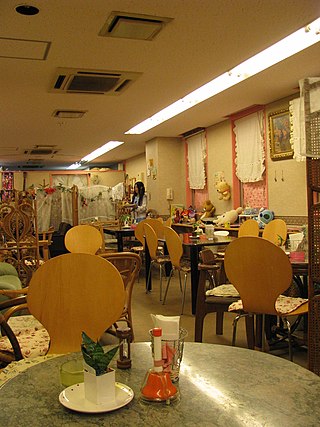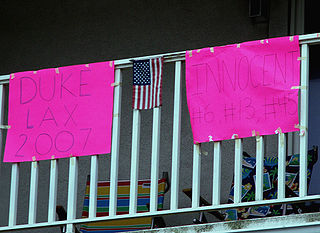Related Research Articles

Richard Halleck Brodhead is an American scholar of 19th-century American literature. He is a former dean of Yale College, and served as the 9th president of Duke University in North Carolina, from 2004 to 2017.

Nightwork: Sexuality, Pleasure, and Corporate Masculinity in a Tokyo Hostess Club (1994) is a book-length study in the field of cultural anthropology of Japan by Anne Allison. This participant-observation ethnography describes the culture surrounding Japanese hostess clubs, which feature female servers specifically intended to flirt with or present a sexually attractive image to their typically white-collar sarariiman (salaryman) clients. Allison's work presents a perspective on corporate life and gender roles in Japan infrequently considered in academia and in Western culture.
A hostess club is a type of night club found primarily in Japan which employs mostly female staff and caters to men seeking drinks and attentive conversation. Host clubs are a similar type of establishment where mostly male staff attend to women. Host and hostess clubs are considered part of mizu shōbai, the night-time entertainment business in Japan.
Nightwork is shift work which is carried out at night.

Cynthia Holden Enloe is an American political theorist, feminist writer, and professor. She is best known for her work on gender and militarism and for her contributions to the field of feminist international relations. She has also influenced the field of feminist political geography, with feminist geopolitics in particular.
No-pan kissa are Japanese sex establishments offering food and drinks served by waitresses wearing short skirts with no underwear. The floors, or sections of the floor, are sometimes mirrored.
The Duke lacrosse rape hoax was a widely reported 2006 criminal case hoax in Durham, North Carolina, United States, in which three members of the Duke University men's lacrosse team were falsely accused of rape. The three students were David Evans, Collin Finnerty, and Reade Seligmann. The accuser, Crystal Mangum, a student at North Carolina Central University and part-time striptease dancer, alleged that the rape occurred at the Durham residence of two of the team's captains, where she had worked on March 13, 2006. Investigation and resolution of the case sparked public discussion of racism, sexual violence, media bias, and due process on campuses. The former lead prosecutor, Durham County District Attorney Mike Nifong, ultimately resigned in disgrace, and was disbarred and briefly imprisoned for violating ethics standards. In December 2024, Mangum admitted to fabricating the assault.
Timeline of anthropology, 1990–1999

Maid cafés are a subcategory of cosplay restaurants found predominantly in Japan and Taiwan. In these cafés, waitresses, dressed in maid costumes, act as servants, and treat customers as masters as if they were in a private home, rather than as café patrons. The first permanent maid café, Cure Maid Café, was established in Akihabara, Tokyo, Japan, in March 2001, but maid cafés are becoming increasingly popular. The increased competition drove the cafes to employ more diversified themes, gimmicks and even unusual tactics to attract customers. They have also expanded overseas to several countries around the world.

Robert David Johnson, also known as KC Johnson, is an American history professor at Brooklyn College and the Graduate Center of the City University of New York. He played a major role in reporting on the Duke lacrosse rape hoax in 2006–2007 in which three members of the Duke University men's lacrosse team were falsely accused of rape. In 2007 he co-authored a book, Until Proven Innocent: Political Correctness and the Shameful Injustice of the Duke Lacrosse Rape Case.
Crystal Gail Mangum is an American former stripper from Durham, North Carolina who has been incarcerated for murder since 2013. In 2006, she came to attention in national news reports for having made false allegations of rape against lacrosse players in the Duke lacrosse case. Mangum's work in the sex industry as a black woman, while the young men she accused were white, generated extensive media interest and academic debate about race, class, gender, and the politicization of the justice system. In December 2024, Mangum admitted to fabricating the assault.
Nada Inada was the pen-name of a Japanese psychiatrist, writer and literary critic active in late Shōwa period and early Heisei period Japan. His pen name is from the Spanish language phrase "nada y nada".

The 2006 Duke University lacrosse case resulted in a great deal of coverage in the local and national media as well as a widespread community response at Duke and in the Durham, North Carolina area.
The Group of 88 is the term for professors at Duke University in North Carolina who in April 2006 signed a controversial advertisement in The Chronicle, the university's independent student newspaper. The advertisement addressed the Duke lacrosse case of the previous month, in which a black stripper falsely accused three white members of Duke's lacrosse team of raping her at a party. The incident was under police investigation when the ad was published, and the signatories were criticized for commenting on the case at that stage. They stated that they were trying to start a dialog about issues of race and sexual assault at the university.

Ganbaru, also romanized as gambaru, is a ubiquitous Japanese word which roughly means to slog on tenaciously through tough times.
Sayo Hayakawa is a Japanese fashion model. She is best known for her stint as a main model for the Koakuma Ageha cabaret-gyaru fashion magazine.
Sayaka Araki is a Japanese fashion model, disc jockey, and businesswoman. She is best known for her stint as a model for the Koakuma Ageha cabaret-gyaru fashion magazine. She was a major contributor to Koakuma Ageha for 4 years and 10 months, since the magazine's very early days. She left Koakuma Ageha in 2011, and has since become a main model for its sister magazine Ane Ageha.

Karla Francesca Holloway is an American academic. She is James B. Duke Professor of English & Professor of Law at Duke University, and holds appointments in the Duke University School of Law as well as the university's Department of English, Department of African & African American Studies, and Program in Women's Studies. Holloway is a member of The Wintergreen Women Writers Collective
Paula Denice McClain, is an American political scientist. She is currently professor of political science, public policy, and African and African American Studies at Duke University and is a widely quoted expert on racism and race relations. Her research focuses on racial minority-group politics and urban politics. She is co-director of Duke's Center for the Study of Race, Ethnicity and Gender in the Social Sciences, and director of the American Political Science Association's Ralph Bunche Summer Institute, which is hosted by Duke and funded by the National Science Foundation and Duke.
Prostitution, as defined under modern Japanese law, is the illegal practice of sexual intercourse with an 'unspecified' (unacquainted) person in exchange for monetary compensation, which was criminalised in 1956 by the introduction of article 3 of the Anti-Prostitution Law. However, the definition of prostitution made illegal under this law is strictly limited to sexual intercourse with an 'unspecified person', and does not criminalise the sale of numerous other acts performed by sex workers in exchange for compensation, such as oral sex, anal sex, mammary intercourse, and other non-coital sex acts; the Businesses Affecting Public Morals Regulation Law of 1948, also known as the "Law to Regulate Adult Entertainment Businesses", amended in 1985, 1999 and 2005, regulates these businesses, making only one definition of prostitution in Japan illegal.
References
- ↑ "Anne Allison". Duke University Cultural Anthropology. Archived from the original on March 4, 2011. Retrieved October 1, 2012.
- ↑ "Department anti-war ad violated law". The Chronicle at Duke University. March 25, 2003. Retrieved October 1, 2012.
- 1 2 "In Loco Parentis… or Just Loco?". National Review Online. March 13, 2007. Retrieved October 1, 2012.
- ↑ Johnson, KC; Taylor, Stuart Jr. (2007). Until Proven Innocent: Political Correctness and the Shameful Injustices of the Duke Lacrosse Rape Case . Macmillan. ISBN 978-0-312-36912-5.
- ↑ https://www.degruyter.com/document/doi/10.1515/9781478024415/html?lang=en